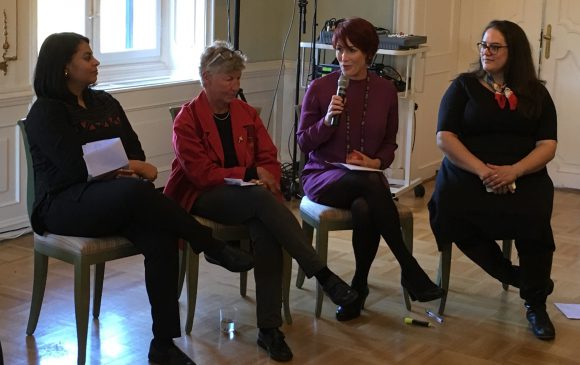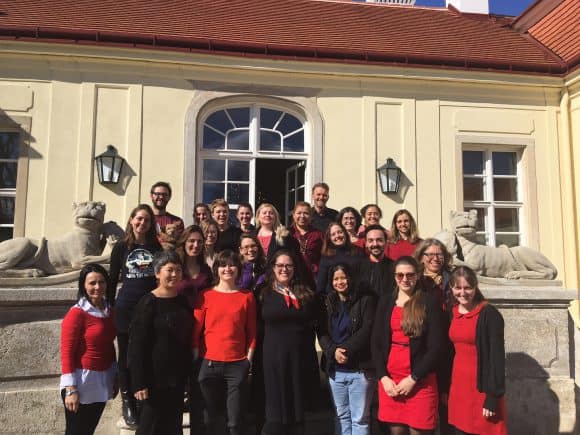Monika Bauer, IIASA Alumni Officer
International Women’s Day is celebrated worldwide every year on 8 March. The event aims to promote the work and rights of women. This year, IIASA celebrated International Women’s Day with a panel discussion which asked the question, “Can a women-empowered world resolve some of the global sustainability challenges?” IIASA Population Researcher Raya Muttarak, moderated the panel that included Tyseer Aboulnasr, Melody Mentz, Shonali Pachauri, and Mary Scholes.
“The IIASA Women in Science Club chose this topic because it would allow the panelists to reflect on the potential welfare benefits of a more gender-balanced world. We wanted to know if balance could benefit both women and men, and we wanted to provide a space to discuss the potential intersectionality of the challenges to female empowerment such as poverty, racism, sexism, access to education, health autonomy, and resource inequality,” said organizer Amanda Palazzo, IIASA Ecosystems Services and Management researcher.
IIASA Director General and CEO Professor Dr. Pavel Kabat opened the discussion by offering a brief history of International Women’s Day in the context of the early history of IIASA.

Melody Mentz gives her thoughts
Mentz, an independent higher education research and evaluation consultant based in South Africa, spoke about the implications that a gender-balanced world could hold for science and sustainability using the African agricultural system as an example. To this end, she presented a few statistics that show how the African food system intersects with the sustainable development goal of gender equality.
According to the most recent Food and Agriculture Organization of the United Nations study, women do up to 50 % of agricultural labor in Africa (this varies by country). Bearing this fact in mind, women however, own only 10 % of the land in Africa; they receive less than 10% of the investments in agriculture on the continent; and less than 5% of women have access to advisory services. In addition, they hold just 14% of management positions in the sector, and only one in four agricultural researchers on the continent is female.
“There is a huge disparity between the contributions of women, the impact of the current food system on women, and the role that the environment allows them to play,” explained Mentz.
As far as the implications of this are concerned, the first, and perhaps the most obvious, is that we need more women in science. Secondly, according to Mentz, we also need more science for women.
“At an institutional level we [should] start thinking differently about what kind of questions we answer. Those questions don’t have to be focused on women, but rather, should consider the implications for both men and women,” she said.
Thirdly, she argued for more science with women, as many research questions and research designs are not just driven by scientists, but actually originate with the people that researchers are trying to help. Finally, we also need more science about women, meaning that data and indicators of impact need to include gender, especially in the context of Africa.
IIASA Energy Researcher Pachauri reflected on the inequalities that we see in our everyday lives. Her work specializes in household energy access in the developing world. Pachauri shared an example from an organization called ENERGIA, of which she is a member of the advisory board, where women were included as microentrepreneurs in the delivery of energy in villages. The organization found that female entrepreneurs were more successful and profitable than the men, which they put down to a greater use of social networks and relationships. The example demonstrated how societies can benefit from including women in solutions for everyday problems.
Aboulnasr, a retired electrical engineering professor, focused on the importance of balance – whether it is a balance of genders, social classes, or geography. Aboulnasr eloquently suggested that rather than striving for perfect balance, one should accept a more dynamic and changing balance. She also stated that one should focus on the impact, rather than on the tools. For example, excellent science is a tool for reaching a goal that makes an impact, rather than excellence in science being the goal. Her advice to the audience was to be open to accepting failure in one’s life.
“If you don’t fail in 30% of what you attempt to do, then you have never reached your limits,” she said, and encouraged the audience to stop obsessing about the failures of the past, seek balance, and to not feel guilty.
Scholes, a professor at the University of Witwatersrand in South Africa, approached the question of the day differently. She urged the audience to look at the question from a sustainability perspective, and to ask what role gender has to play in stewardship for the planet. In addition, she asked the audience to consider whether our unstainable use of resources is because of gender inequality, or because of a more underlying misalignment of values, and what type of empowerment might be needed to achieve a more sustainable world.
“As far as we know, this is the first panel discussion hosted at IIASA which has specifically tried to examine the role of women in achieving a sustainable future. We learned that there are pockets of IIASA research already exploring this this issue and that there is room and interest to engage in this discussion in the future,” says Palazzo.
It is clear that there is no simple answer to the issues surrounding the topic of our International Women’s Day panel discussion. The event however, highlighted unique reflections and experiences from each panelist, and the IIASA Women in Science Club will continue to explore and push the discussion forward. We look forward to updating you soon.

Some of of the panel discussion attendees wearing red, purple and black themed clothes for International Women’s Day

You must be logged in to post a comment.